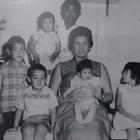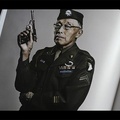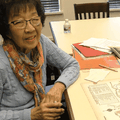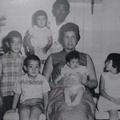Aiko Fujii was born in Hiroshima City, Hiroshima Prefecture, and experienced the war from age 6 to 10 before moving to Seattle when she got married. A member of the Seattle branch of the American Calligraphy Study Group and the Seattle Betsuin Buddhist Church, she has been active in the Japanese community in Seattle through calligraphy, flower arrangement, and tea ceremony. We spoke to her about her life in Japan from the war until she moved to the United States, and her memories of her father, Katsuro Nanamori, who experienced the atomic bomb.
During the war, Aiko and her family evacuated to Fukuyama City, Hiroshima Prefecture, away from Katsuro, who worked at Hiroshima City Hall as an inspector for the Hiroshima City Board of Education. Fukuyama City was also attacked by B-29 bombs on August 5, 1945, the day before the Hiroshima atomic bombing. However, her mother and siblings, who had moved away from Hiroshima, escaped the disaster.
The atomic bomb was dropped on Hiroshima at 8:15 a.m. on August 6, 1945. Katsuro, who had remained in Hiroshima, was scheduled to go to work that afternoon, so he was fortunate to be at home, a little away from the center of the city, on the morning the bomb was dropped. "Our house was near the foot of Hijiyama and was in the shadow of the mountain, so it didn't collapse. And my father happened to be reading the newspaper in the back room, not on the veranda, so he was saved (avoiding direct exposure to radiation). Apparently the blast was strong enough to blow away the iron sewing machine that was on the veranda. There was a lot of good fortune that came together," says Aiko. Katsuro, feeling responsible, immediately headed to the city hall near the Atomic Bomb Dome. The bridge leading to the city hall had collapsed, and the river was filled with burned survivors who had jumped into the water, a situation Katsuro could never have imagined. He also began to feel clearly unwell, with his head pounding from the high level of radiation.
It was one week after the atomic bomb that Ai-ko and her family in Fukuyama learned that Katsuro was safe. A villager in Hiroshima who was looking for his relatives met Katsuro as he was identifying the victims, and delivered the business card he had given them to the evacuation site in Fukuyama. The family breathed a sigh of relief when they saw Katsuro's handwriting on the back of the card. A few days later, when Katsuro came to visit the evacuation site, his mother, who had been ill in bed, immediately stripped her son and made sure he had no injuries on his body. She regained her strength with the joy of realizing that he was truly alive.
One month after the war ended, the mother and children returned to their home in Hiroshima. Even after the war ended, the confusion and food shortages continued. "My father didn't eat a single grain of rice that we received while we were away, but saved it for his children," Aiko recalled with tears in her eyes. Katsuro fed his seven children with the food he received from the rations, and he himself ate only vegetables such as pumpkins, sweet potatoes, tomatoes, and cucumbers that he harvested from his home garden, and enjoyed a bottle of sake every night. Aiko later learned that Katsuro was exposed to the atomic bomb in Hiroshima, but did not suffer from any aftereffects after the bombing because he consumed vitamins from vegetables and alcohol, which are said to be effective in reducing the effects of radiation, rather than food that contained radiation.
In 1955, Aiko moved to the United States at the age of 20 to marry her husband, Fujii Minoru. Born in Seattle, Fujii Minoru was the grandson of Fujii Chojiro, a first-generation Japanese immigrant who built the foundations of the Seattle Japanese community by becoming successful in dairy farming and hotel management, and establishing the Seattle Buddhist Church. He was also one of the people who experienced the tragedy of the Hiroshima atomic bomb.
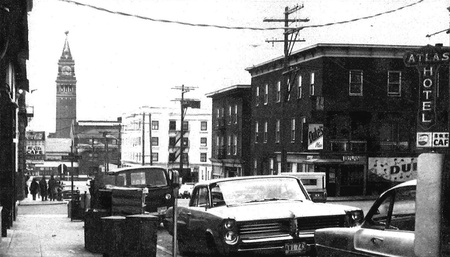
In 1935, when the American economy was sluggish and Japanese immigrants were facing strong criticism due to the Great Depression, Minoru, who was a primary school student at the time, and his younger brother Hisashi left their hometown of Seattle with their mother Shige and crossed the Pacific Ocean to live with Chojiro, who had returned to Hiroshima a few years earlier. Shige then returned to Seattle, leaving his two children behind, to help his father run a hotel, and Chojiro passed away in 1937. Minoru and Hisashi, who lived alone apart from their parents at a young age, were very close brothers. Later, Minoru went on to study at Kyushu University. During the war, the family was separated, with his parents in a Japanese-American internment camp in the US and Hisashi living in Hiroshima.
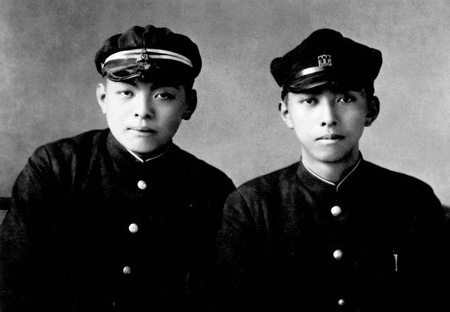
Then, in 1945, the atomic bomb was dropped on Hiroshima. In fact, he lost his younger brother, Hisashi. Although Hisashi had been accepted to attend Hiroshima High School, which had been his dream, his junior high school labor mobilization was extended due to the war, and his entrance ceremony had only just taken place on August 1st. In fact, in a document he contributed to the 70th anniversary commemorative magazine of Hiroshima High School, he wrote, "When I thought that Hiroshima had really been annihilated and that Hisashi had died, tears flowed uncontrollably and I felt heartbroken."
After the war, he actually returned to Seattle to work, but visited Hiroshima to find a husband, where he met his wife, Aiko, through an arranged marriage. They were married in 1955, 10 years after the war, and Aiko came to live in Seattle. Even though the war was over, how did Aiko feel when she decided to live in the country that had dropped the atomic bomb? "I was still young at the time, so I felt neither happy nor sad. I left the matchmaking to my parents, and didn't feel like it was happening to me. But now I wonder what my parents were thinking when they sent me off."
Looking back on the story of the couple who experienced the Hiroshima atomic bomb in different ways, I felt that the history of Japanese immigrants cannot be told without looking back at the events during the war. When I was a child, my grandmother told me that during the war, there was no food, so children ate grass and nuts from the roadside. War experiences that are passed down from person to person are well remembered even after a long time. More than 70 years have passed since the end of the war, but passing down the stories of the war is not only to ensure that the tragedies of wartime do not fade away, but also to pass down the history of Japanese immigrants.
(Some titles omitted)
*This article is reprinted from the North American Newspaper (May 23, 2018).
You can read the Fujii Family story in English by Sharon Ideguchi here. >>
© 2018 Minami Hasegawa / The North American Post


